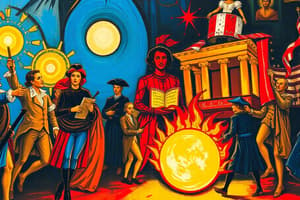Podcast
Questions and Answers
What was the primary reason behind the British Proclamation of 1763?
What was the primary reason behind the British Proclamation of 1763?
- To abolish the English Bill of Rights
- To impose taxes on American colonists
- To restrict American settlement beyond the Appalachian Mountains (correct)
- To grant representation to colonists in Parliament
What was the main issue with the British taxation of American colonists?
What was the main issue with the British taxation of American colonists?
- The taxes were imposed without granting representation in Parliament (correct)
- The taxes were only imposed on certain colonies
- The taxes were too high
- The taxes were only imposed on wealthy colonists
What was the main concern with the British Writs of Assistance?
What was the main concern with the British Writs of Assistance?
- They imposed heavy taxes on colonists
- They allowed customs officials to search colonists' homes without probable cause (correct)
- They abolished the English Bill of Rights
- They granted representation to colonists in Parliament
What was the primary purpose of the British Intolerable Acts?
What was the primary purpose of the British Intolerable Acts?
Which Enlightenment thinker influenced American colonists' views on governance and independence?
Which Enlightenment thinker influenced American colonists' views on governance and independence?
What philosophical perspective emphasized individual rights, liberty, and limited government?
What philosophical perspective emphasized individual rights, liberty, and limited government?
Flashcards are hidden until you start studying
Study Notes
American Revolution: Legal and Philosophical Perspectives
Legal Perspective
- Proclamation of 1763: British decree that prohibited American colonists from settling beyond the Appalachian Mountains, leading to resentment and resistance.
- Taxation without Representation: British imposition of taxes on colonists without granting them representation in Parliament, violating the English Bill of Rights.
- Writs of Assistance: British search warrants that allowed customs officials to search colonists' homes and businesses without probable cause, sparking outrage and protests.
- Intolerable Acts: Series of laws passed by the British Parliament in response to colonial protests, including the Boston Massacre, which further fueled American resistance.
Philosophical Perspective
- Enlightenment Ideas: Influence of European thinkers like John Locke, who argued that government derives its power from the consent of the governed and that citizens have the right to revolt against tyranny.
- Liberalism: Emphasis on individual rights, liberty, and limited government, which shaped American colonists' views on governance and independence.
- Republican Ideals: Focus on civic virtue, representation, and the common good, which informed the development of American democracy and the Constitution.
- Natural Rights: Belief in the inherent and universal rights of individuals, such as life, liberty, and property, which justified the American Revolution and the creation of a new nation.
Key Figures
- John Locke: Influential philosopher who shaped American colonists' views on government and individual rights.
- Thomas Paine: Author of "Common Sense," which advocated for American independence and influenced public opinion.
- Thomas Jefferson: Principal author of the Declaration of Independence, which articulated the philosophical foundations of the American Revolution.
Studying That Suits You
Use AI to generate personalized quizzes and flashcards to suit your learning preferences.




